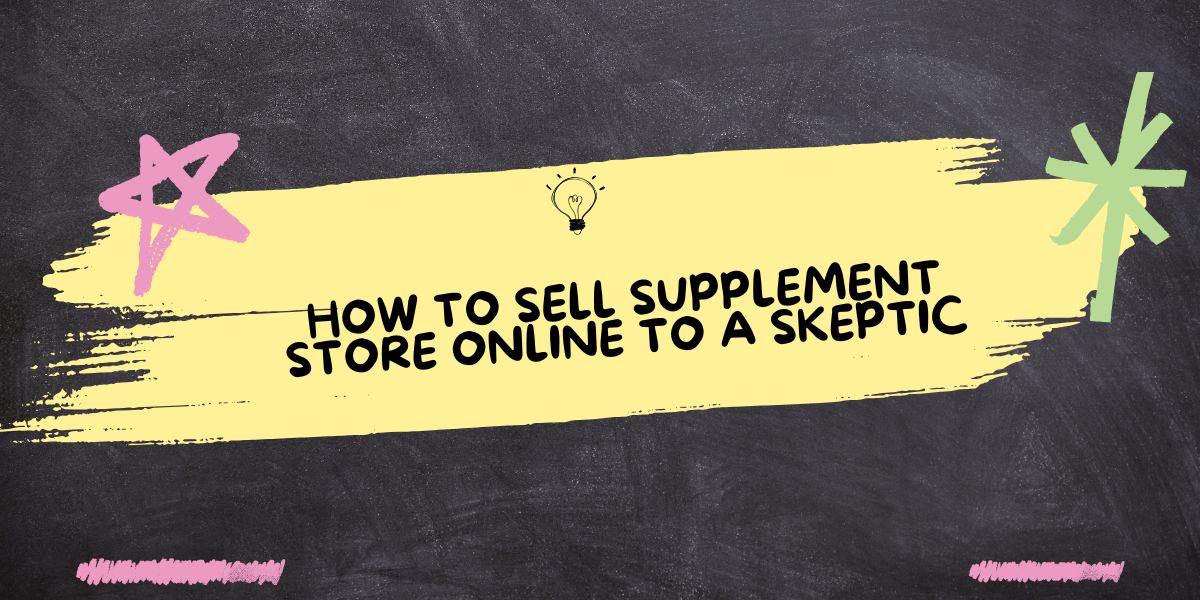Introduction
Selling your supplement store online is a challenging yet rewarding endeavor. While the health and wellness industry is booming, skeptics often approach supplements with doubt, questioning product quality, efficacy, or even the legitimacy of online sellers. Winning over these skeptical customers requires strategy, transparency, and trust-building. Shopping at a supplement store online allows you to explore a vast selection of products at your fingertips.
In this comprehensive guide, we’ll discuss how to effectively sell your supplement store online, even to the most doubtful customers. We’ll also include FAQs to address common concerns that skeptics may have, ensuring you’re well-equipped to convert hesitation into loyalty.
Understanding the Skeptical Customer
A skeptic isn’t inherently against purchasing supplements but is cautious due to valid concerns, such as:
- Misinformation: The supplement industry has been plagued by exaggerated claims and subpar products.
- Safety Concerns: Many worry about unregulated ingredients or harmful side effects.
- Efficacy Doubts: People question whether supplements will deliver the promised results.
- Online Shopping Hesitations: Concerns about scams, counterfeit products, and insecure transactions linger.
Addressing these doubts with clear communication, superior service, and evidence-backed products is key.
Step 1: Build a Trustworthy Brand
Trust is the cornerstone of any online business, especially in the supplement industry.
1.1 Transparency
- Clearly display product ingredients, manufacturing processes, and certifications.
- Share information about your sourcing, including whether ingredients are organic, non-GMO, or sustainably harvested.
1.2 Certifications and Testing
- Partner with manufacturers who adhere to Good Manufacturing Practices (GMP).
- Highlight third-party testing for purity and potency.
1.3 Customer Reviews
- Showcase testimonials and reviews from real customers.
- Encourage users to share before-and-after results (with their consent).
? Pro Tip: Displaying certifications such as NSF or FDA registration instantly boosts credibility.
Step 2: Focus on Education
Many skeptics lack adequate knowledge about supplements and how they work. Your job is to fill this gap.
2.1 Provide Educational Content
- Write blog posts and articles explaining the benefits of supplements.
- Create infographics or videos that simplify complex topics, such as the difference between omega-3 and omega-6 fatty acids.
2.2 Host Webinars and Q&A Sessions
Invite healthcare professionals to talk about the science behind supplements. Allow skeptics to ask questions during these sessions.
2.3 Share Research
Include links to scientific studies supporting your claims. For example, if you sell vitamin D supplements, reference research that discusses its benefits for bone health.
Step 3: Prioritize Product Quality
Low-quality products will turn off even the most curious skeptics.
3.1 Offer Diverse Options
- Stock products that cater to various needs, including fitness supplements, multivitamins, herbal remedies, and specialty items like gluten-free or vegan options.
3.2 Highlight Proven Ingredients
- List the active ingredients and their benefits. For example, explain how ashwagandha reduces stress or how probiotics improve gut health.
3.3 Avoid Overpromising
- Don’t exaggerate the benefits of your products. Set realistic expectations to prevent disappointment.
? Pro Tip: Include "Made in the USA" or other location-specific labels to assure quality.
Step 4: Create an Exceptional Online Shopping Experience
A seamless, user-friendly shopping experience goes a long way in reassuring skeptics.
4.1 Optimize Your Website
- Use a clean, professional design with intuitive navigation.
- Ensure your site loads quickly and works on mobile devices.
4.2 Provide Secure Payment Options
- Highlight that your payment gateway is encrypted. Offer multiple payment methods for convenience.
4.3 Offer Money-Back Guarantees
- A clear return policy reduces perceived risk for skeptics.
4.4 Live Chat Support
- Provide instant answers to customer questions, helping them make informed decisions.
Step 5: Leverage Social Proof and Influencers
Nothing convinces a skeptic better than seeing others vouch for your brand.
5.1 Collaborate with Influencers
- Partner with trusted fitness trainers, dietitians, or wellness influencers. Their endorsement can help build credibility.
5.2 Feature User-Generated Content
- Encourage customers to share photos, videos, or reviews of your products on social media.
5.3 Engage on Social Media
- Use platforms like Instagram and Facebook to showcase your products in action, share customer testimonials, and post educational content.
Step 6: Provide Excellent Customer Support
Your relationship with customers doesn’t end at the point of sale.
6.1 Follow-Up Emails
- Send personalized emails to thank customers for their purchase and provide usage tips.
6.2 Address Concerns Promptly
- If a customer raises an issue, resolve it quickly and professionally.
6.3 Build Loyalty Programs
- Offer discounts or rewards for repeat purchases to encourage long-term relationships.
? Pro Tip: Use feedback to improve your products and services continuously.
FAQs About Selling Supplements Online
- Is it legal to sell supplements online?
Yes, but you must comply with local and international regulations. Ensure your products meet safety standards and do not make unsubstantiated claims. - How can I assure customers of product safety?
Work with reputable manufacturers and ensure your products are third-party tested. Clearly display certifications and safety labels. - What are the best platforms for selling supplements online?
Popular platforms include Shopify, WooCommerce, and Amazon. Social media platforms like Instagram and Facebook can also drive sales through targeted ads and direct links. - How do I handle negative reviews?
Address them professionally by acknowledging the issue, offering a solution, and thanking the customer for their feedback. - What’s the best way to market supplements to skeptics?
Educate them with blogs, webinars, and transparent product information. Build trust by showcasing certifications and customer reviews. - Should I sell private-label or branded supplements?
Both have their merits. Private-label supplements allow for more customization, while branded supplements often come with established trust. - How can I compete with big brands?
Focus on niche markets, personalized service, and educational content to differentiate your store. - Are there risks involved in selling supplements?
Yes, including legal risks from unsubstantiated claims or selling unregulated products. Always stay compliant and transparent. - How do I attract repeat customers?
Offer loyalty programs, discounts, and exceptional customer service. Follow up with helpful tips and recommendations. - How do I price my supplements competitively?
Research competitor pricing and factor in costs such as manufacturing, shipping, and marketing.
Conclusion
Selling a supplement store online to skeptics requires a blend of transparency, quality, education, and excellent service. By focusing on building trust, offering value, and addressing customer concerns, you can convert even the most hesitant shoppers into loyal customers.
Follow the six steps outlined above—build a trustworthy brand, educate your audience, prioritize product quality, create a seamless shopping experience, leverage social proof, and provide top-notch customer service—and watch your online supplement store thrive.
By addressing common questions and being transparent in your practices, you’ll foster credibility, which is essential in the competitive supplement industry. With time and consistent effort, even skeptics will see your store as a reliable source for their health and wellness needs.



